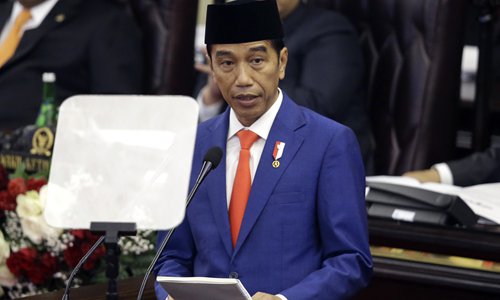Indonesian president’s approval rating hits 6-year low as prices rise

Indonesian President Joko Widodo delivers his state of the nation address ahead of the country's Independence Day in parliament, in Jakarta on Friday. In his address, Widodo asked parliament to sign off on proposals to move the nation's capital from Jakartato to Borneo island. Photo: AP
Indonesian President Joko Widodo's approval rating has hit a six-year low amid dissatisfaction over soaring cooking oil prices and the perceived failure of an export ban to swiftly reduce the rising cost of goods, a new poll showed on Sunday.Figures released by pollster Indikator Politik Indonesia showed that satisfaction with president, widely known by as Jokowi, fell to 58.1 percent in May.
The figures are the lowest rating since December 2015 when the president's approval slumped to 53 percent.
The decline, which follows a 12-point drop from January to April, comes as Southeast Asia's largest economy has struggled to reign in domestic cooking oil prices, a household staple in Indonesia, and after a shock decision to ban palm oil exports late in April.
Indonesia is the world's largest producer of palm oil and the policy decision stunned global markets.
At the time president Jokowi said the need for affordable food trumped revenue concerns, and the ban would be lifted after domestic needs were met.
Conducted from May 5 to 10, the Indikator survey said the decline in Jokowi's approval was largely related to the rising cost of cooking oil and flow-on inflationary effect, and the gap between policy expectations and realities on the ground, after the export ban failed to see prices drop significantly after the decision.
The poll found that while almost 90 percent supported the ban, more than 72 percent said cooking oil prices remained less affordable, or not affordable at all.
Reuters
